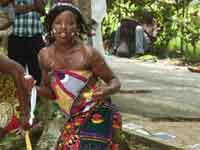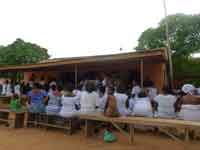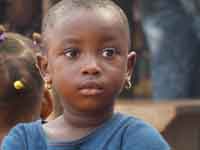

Togo is bordered by Ghana to the west, Benin to the east and Burkina Faso to the north. It extends south to the Gulf of Guinea, where its capital Lomé is located. Togo has a population of approximately 6.7 million. It is a tropical, sub-Saharan nation, highly dependent on agriculture, with a climate that provides good growing seasons. Togo is one of the smallest countries in Africa. The official language is French. The largest religious group in Togo are those with indigenous beliefs, and there are significant Christian and Muslim minorities.
From the 11th to the 16th century, various tribes entered the region from all directions. From the 16th century to the 18th century, the coastal region was a major trading centre for Europeans in search of slaves, earning Togo and the surrounding region the name "The Slave Coast". In 1884, Germany declared Togoland a protectorate. During World War I this German territory was invaded by British troops from the neighbouring Gold Coast colony and French troops coming from Dahomey.
After World War I, Togoland was separated into two League of Nations mandates, administered by Britain and France. After World War II, these mandates became UN Trust Territories. The residents of British Togoland voted to join the Gold Coast as part of the new independent nation of Ghana in 1957, and French Togoland became an autonomous republic within the French Union in 1959.
Independence for French Togoland came in 1960 under Sylvanus Olympio. He was assassinated in a military coup on 13 January 1963 by a group of soldiers under the direction of Sergeant Etienne Eyadéma Gnassingbé. Opposition leader Nicolas Grunitzky was appointed president by the "Insurrection Committee", headed by Emmanuel Bodjollé. On 13 January 1967, Eyadéma Gnassingbé overthrew Grunitzky in a bloodless coup and assumed the presidency, which he held from that date until his sudden death on 5 February 2005 after 38 years in power, the longest occupation of any dictator in Africa.
The military's immediate installation of his son, Faure Gnassingbé, as president in 2005, provoked widespread international condemnation, except from France. Some democratically elected African leaders such as Abdoulaye Wade of Senegal and Olusegun Obasanjo of Nigeria supported the move, thereby creating a rift within the African Union. Gnassingbé was re-elected for a second term in 2010. In February 2015, he announced that he would be seeking a third term in the 2015 election, and has just won that.

Click on thumbnail image to get a larger photograph
 |
 |
 |
 |
 |
 |
 |
 |
 |
 |
 |
 |
 |
 |
 |
 |
 |
 |
 |
 |
 |
 |
 |
 |
 |
We were taken to a school deep in the countryside, which was really interesting. One could see the signs of voodoo around the village. Curiously we came across an English speaking family who had returned to the village for a funeral. They lived a few miles away in Ghana and it showed how artificial the borders were, as drawn up by the colonial powers.
Another strange fact was that we were told that all the girls in state schools had to have their hair shaved to stop them spending hours every day beautifying it. I was dubious of this, but found a BBC article confirming the hair instruction
Togolese schoolgirls have been sent home this week to have their heads shaved because teachers say they waste too much time playing with their hair.
The education minister urged more moderation in girls' dress and hairstyles in the classroom. Schools blame the distraction of fashion for girls' low academic record. "They must know how to organise themselves and use their time in order to succeed in their studies instead of wasting their time - three hours, sometimes days - with their hair," said Madame Olympio, a teacher at Lycee Nyekonakpoe in the capital, Lome. "Girls' success rates are lower than boys'," she said. Pupils from both junior and senior schools have been affected by the schools' ruling and hairdressers in the capital have been doing swift business since Monday morning. But some girls have been refusing to return to class because they do not want to lose their locks. Only state schools are insisting on the head shaving and one girl told me she would now opt to go a private school rather than take a trip to the hairdressers.
Click on thumbnail image to get a larger photograph
 |
 |
 |
 |
 |
 |
 |
 |
 |
 |
 |
 |
 |
 |
 |
 |
 |
 |
 |
 |
We then, with our police outriders, headed further inland, for a visit to another village, complete with dancers, a tour round what had been a plantation and lunch, before driving back to the coast
Click on thumbnail image to get a larger photograph
 |
 |
 |
 |
 |
 |
 |
 |
 |
 |
 |
 |
 |
 |
 |
 |
 |
We were spectators at what seemed a genuine voodoo ceremony. They had been going some time before we arrived, and when we left after about an hour, the thing was still in full swing. I suppose a bit like church services in Britain, the congregation were mainly women. The idea seemed to be to get into a trance, then have the evil washed out of you, with the help of a live sacrifice - which these days is the egg rather than the chicken. Whilst the ceremony was taking place, children played and vendors sold food.
Click on thumbnail image to get a larger photograph
 |
 |
 |
 |
Our ride back to the ship was smoothed by our police escort, and a local group performed on the ship.